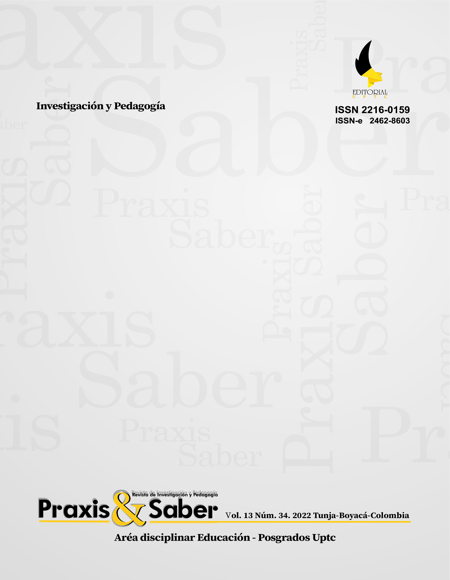Educational environment in boarding schools and psychological well-being of teachers and students

Abstract
Beyond technical and scientific aspects, school environment is important for the overall
development of the human being. Examples of this are the educational activities aimed at
promoting the health of those involved in such environment. The objective of this study was to
investigate the connection between the educational environment in boarding schools and the promotion of psychological well-being of teachers and students. This is an applied and crosssectional study, with a quantitative approach, carried out with 27 teachers and 129 students
of Basic Education in a boarding school in the south of Brazil. The instruments used were
a sociodemographic questionnaire and the Psychological Well-Being Scale. The results show
a significant relationship between the educational environment of the boarding school and
the promotion of psychological well-being. All teachers and 106 students emphasized the
importance of this experience for personal growth, autonomy, and self-acceptance. In addition,
84 students (79.3%) reported high levels of psychological well-being, while 22 students (20.7%)
reported low levels. Thus, the environment of the boarding school and the experiences lived
with the people involved in this context directly influence the process of self-acceptance,
interpersonal relationships, and autonomy of those who are there.
Keywords
teachers, adolescent, mental health, education, well-being
References
- Brasil. (2014). Portaria MS/GM nº 2.446, de 11 de novembro de 2014. Redefine a Política Nacional de Promoção da Saúde (PNPS). Diário Oficial da União 2014. http://bvsms.saude.gov.br/bvs/publicacoes/pnps_revisao_portaria_687.pdf
- Cavadas, S. (2011). Suporte social e comportamento anti-social: estudo da relação entre a percepção e a conduta anti-social dos adolescentes [Dissertação de Mestrado, Universidade de Coimbra]. Repositório Científico da UC. https://estudogeral.sib.uc.pt/bitstream/10316/18235/1/Tese.pdf
- Cordero-López, B., & Calventus-Salvador, J. (2022). Parentalidad y su efecto en la autodeterminación y el bienestar adolescente. Revista Latinoamericana de Ciencias Sociales, Niñez y Juventud, 20(1), 232-254. https://doi.org/10.11600/rlcsnj.20.1.5118
- Deci, E., & Ryan, R. (2008). Hedonia, eudaimonia, and well-Being: An introduction. Journal of Happiness Studies, 9(1), 1-11. https://doi.org/10.1007/s10902-006-9018-1
- Ferreira, D. (2008). Estatística Multivariada (1ª ed.). Editora UFLA.
- Fleming, M. (1988). Autonomia comportamental na adolescência. Percepções das atitudes parentais [Dissertação de Doutoramento, Universidade do Porto]. CORE. https://core.ac.uk/download/pdf/70650435.pdf
- Guimarães, C., Pontes, L., Silva, F., & Nunes, I. (2019). A (há) saúde mental do professor de psicologia. Trabalho (En) Cena, 4(2), 409-429. https://doi.org/10.20873/25261487V4N2P409.
- Johnson, R., & Wichern, D. (2007). Applied multivariate statistical analysis. Prentice Hall.
- Kerby, D. (2014). The Simple Difference Formula: An Approach to Teaching Nonparametric Correlation. Comprehensive Psychology, 3(1), 1-9. https://doi.org/10.2466%2F11.IT.3.1.
- Lima, S., Gouveia, S., Anes, E., Brás, M., & Geraldes, M. (2021). Bem-estar psicológico da população portuguesa. International Journal of Developmental and Educational Psychology, 1(1), 297-302.
- https://doi.org/10.17060/ijodaep.2021.n1.v1.2066
- Machado, W. (2013). Escala de bem-estar psicológico: Adaptação para o português brasileiro e evidências de validade [Dissertação de Mestrado, Universidade Federal do Rio Grande do Sul]. Lume Repositório Digital. https://www.lume.ufrgs.br/handle/10183/29716/
- Machado, W., Bandeira, D., & Pawlowski, J. (2013). Validação da Psychological Well-being Scale em uma amostra de estudantes universitários. Avaliação Psicológica, 12(2), 263-272. http://pepsic.bvsalud.org/scielo.php?script=sci_arttext&pid=S1677-04712013000200017&lng=pt&tlng=pt
- Mello, M., & Araújo, C. (2013). Velhice e espiritualidade na perspectiva da Psicologia Analítica. Boletim Academia Paulista de Psicologia, 33(84), 118-141. https://www.redalyc.org/pdf/946/94632386011.pdf
- Minayo, M., & Gualhano, L. (2015). Problemas sociais e de saúde na adolescência. Ciência e Saúde Coletiva, 20(11). https://www.scielo.br/scielo.php?script=sci_arttext_pr&pid=S1413-81232015011200001
- Ministério da Saúde do Brasil. (2017). Proteger e cuidar da saúde de adolescentes na atenção básica. https://bvsms.saude.gov.br/bvs/publicacoes/proteger_cuidar_adolescentes_atencao_basica.pdf
- Naito, T., Tomata, Y., Otsuka, T., Tsuno, K., & Tabuchi, T. (2022). Did Children in Single-Parent Households Have a Higher Probability of Emotional Instability during the COVID-19 Pandemic? A Nationwide Cross-Sectional Study in Japan. International Journal of Environmental Research and
- Public Health, 19(7), 4239. https://doi.org/10.3390/ijerph19074239.
- Nery, N., Jordão, L., & Freire, M. (2022). Educational quality and oral health promotion in Brazilian schools: a multilevel analysis of national data. Brazilian Oral Research, 36, e040. https://doi.org/10.1590/1807-3107bor-2022.vol36.0040
- Oliveira de, C. (2018). A relação entre os problemas internalizantes e externalizantes e o bem-estar psicológico na adolescência [Dissertação de Mestrado, Universidade de Lisboa]. Repositório da Universidade de Lisboa. https://repositorio.ul.pt/bitstream/10451/37557/1/ulfpie053217_tm.pdf
- Paiva, M. (2019). A Afetividade e o Processo Ensino-Aprendizagem [Trabalho de conclusão de curso, Universidade do Estado do Amazonas]. Repositório Institucional UEA. http://177.66.14.82/bitstream/riuea/1483/1/A%20Afetividade%20e%20o%20Processo%20Ensino-Aprendizagem.pdf.
- Rezapour, M., Dehzangi, A., & Saadati, F. (2022). Students’ negative emotions and their rational and irrational behaviors during COVID-19 outbreak. PloS One, 17(3), e0264985. https://doi.org/10.1371/journal.pone.0264985
- Ryan, R., & Deci, E. (2001). On happiness and human potentials: A review of research on hedonic and eudaimonic well-being. Annual Review of Psychology, 52(1), 141-166. https://www.annualreviews.org/doi/abs/10.1146/annurev.psych.52.1.141
- Ryff, C. D. (1989). Happiness is everything, or is it? Explorations on the meaning of psychological wellbeing. Journal of Personality and Social Psychology, 57(6), 1069–1081. https://doi.org/10.1037/0022-3514.57.6.1069
- Ryff, C. D., & Essex, M. J. (1992). The interpretation of life experience and well-being: The sample case of relocation. Psychology and Aging, 7(4), 507-517. http://dx.doi.org.ez45.periodicos.capes.gov.br/10.1037/0882-7974.7.4.507.
- Santos, T., Tomé, G., Gómez-Baya, D., Guedes, F., Cerqueira, A., Borges, A., & Matos, M. (2019). O bem-estar e a saúde mental dos adolescentes portugueses. Revista de Psicologia da Criança e do Adolescente, 10(1), 17-27. http://revistas.lis.ulusiada.pt/index.php/rpca/article/view/2626.
- Simões, F., Calheiros, M., Silva, M., Sousa, Á., & Silva, O. (2018). Total and Attuned Multiple Autonomy Support and the Social Development of Early Adolescents. Journal of Child and Family Studies, 27(2), 374-386. https://doi.org/10.1007/s10826-017-0911-5
- Strelhow, M. (2017). Bem-estar de adolescentes e a sua relação com a espiritualidade e a religiosidade [Tese de Doutorado, Universidade Federal do Rio Grande do Sul]. Lume Repositório Digital. https://lume.ufrgs.br/bitstream/handle/10183/181076/001067525.pdf?sequence=1&isAllowed=y
- Vieira, V., Santos, G., Resende, M., Cunha, V., & Vieira, C. (2019). Aprendizagem na adolescência e práticas pedagógicas: as representações sociais de professores da educação básica. Cadernos da FUCAMP, 18(33), 83-104. https://www.fucamp.edu.br/editora/index.php/cadernos/article/view/1705
